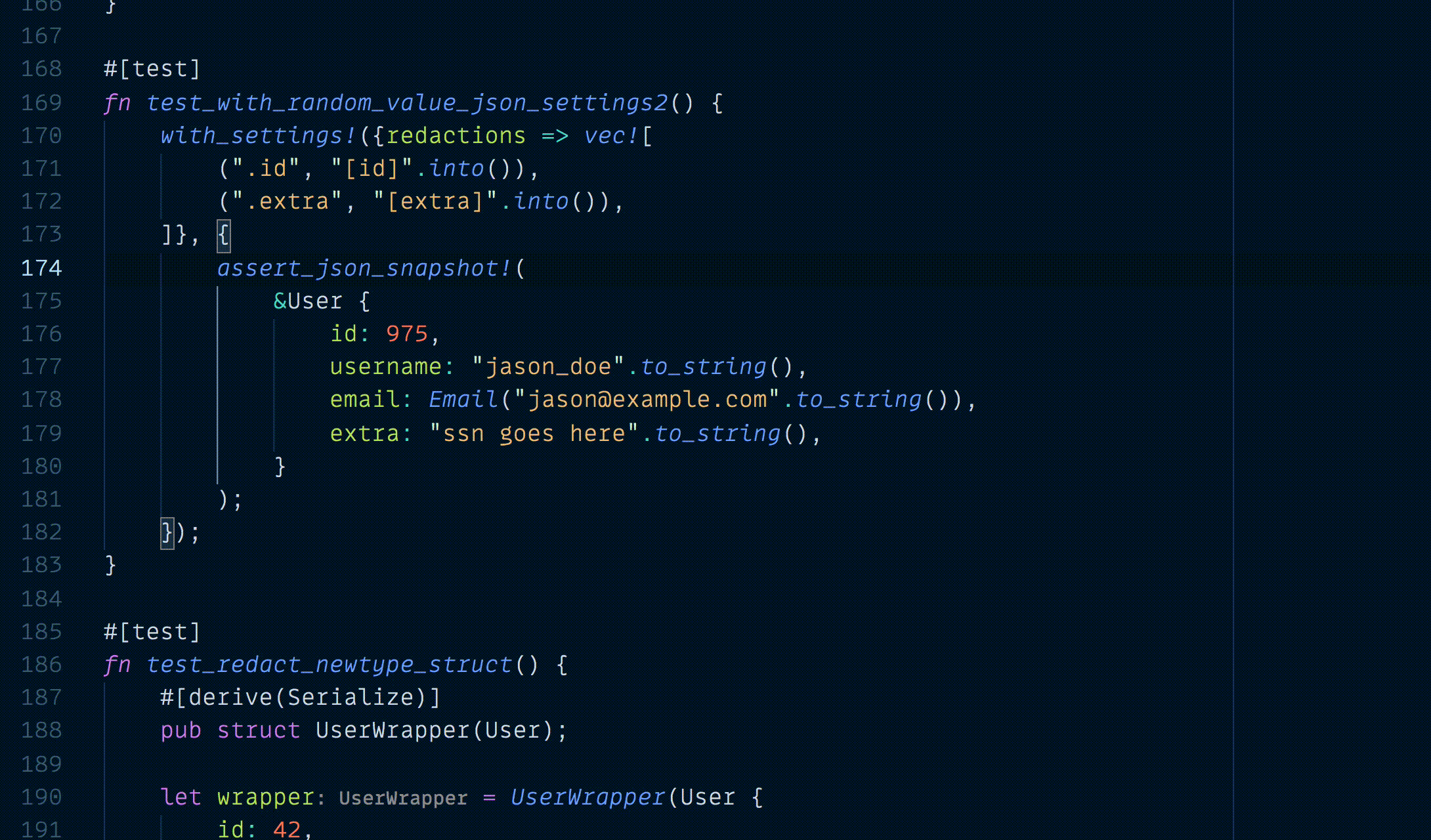Seems to be a re-occurrence of #42
This is with cargo-insta and insta 1.1.0
Some snapshots are updating incorrectly as per the original issue (adding additional content past the end of the snapshot string), have also run into some panics as below where it's ending up trying to splice in the middle of a char.
Source code of the test causing segfault:
adb!(
ty("forall N:N. forall A:*. (A -> 1 + 1) -> Vec N A -> some K:N. Vec K A"),
@"(∀ν : ℕ. (∀α : ⋆. ((α → (1 + 1)) → (Vec ν α → (∃κ : ℕ. Vec κ α)))))"
);
Snapshot file and log/backtrace when interacting with updating:
{"run_id":"1604428650-748676057","line":166,"new":{"module_name":"hale__sac__parser__tests","snapshot_name":"type_parsing-5","metadata":{"source":"src/sac/parser.rs","expression":"ty(\"forall N:N. forall A:*. forall B:*.(A -> B) -> Vec N A -> Vec N B\")"},"snapshot":"(∀ν : ℕ. (∀α : 🟊. (∀β : 🟊. ((α → β) → (Vec ν α → Vec ν β)))))"},"old":{"module_name":"hale__sac__parser__tests","metadata":{},"snapshot":"(∀ν : ℕ. (∀α : ⋆. (∀β : ⋆. ((α → β) → (Vec ν α → Vec ν β)))))"}}
{"run_id":"1604428650-748676057","line":170,"new":{"module_name":"hale__sac__parser__tests","snapshot_name":"type_parsing-6","metadata":{"source":"src/sac/parser.rs","expression":"ty(\"forall N:N. forall A:*. (A -> 1 + 1) -> Vec N A -> some K:N. Vec K A\")"},"snapshot":"(∀ν : ℕ. (∀α : 🟊. ((α → (1 + 1)) → (Vec ν α → (∃κ : ℕ. Vec κ α)))))"},"old":{"module_name":"hale__sac__parser__tests","metadata":{},"snapshot":"(∀ν : ℕ. (∀α : ⋆. ((α → (1 + 1)) → (Vec ν α → (∃κ : ℕ. Vec κ α)))))"}}
-old snapshot
+new results
──────────────────────────────────────────────────────────────────────────────────────────────────────────────────────────
ty("forall N:N. forall A:*. (A -> 1 + 1) -> Vec N A -> some K:N. Vec K A")
────────────┬─────────────────────────────────────────────────────────────────────────────────────────────────────────────
1 │-(∀ν : ℕ. (∀α : ⋆. ((α → (1 + 1)) → (Vec ν α → (∃κ : ℕ. Vec κ α)))))
1 │+(∀ν : ℕ. (∀α : 🟊. ((α → (1 + 1)) → (Vec ν α → (∃κ : ℕ. Vec κ α)))))
────────────┴─────────────────────────────────────────────────────────────────────────────────────────────────────────────
a accept keep the new snapshot
r reject keep the old snapshot
s skip keep both for now
thread 'main' panicked at 'byte index 82 is not a char boundary; it is inside '∃' (bytes 80..83) of ` @"(∀ν : ℕ. (∀α : ⋆. ((α → (1 + 1)) → (Vec ν α → (∃κ : ℕ. Vec κ α)))))"`', /home/chris/.rustup/toolchains/stable-x86_64-unknown-linux-gnu/lib/rustlib/src/rust/src/libcore/str/mod.rs:2052:47
stack backtrace:
0: backtrace::backtrace::libunwind::trace
at /cargo/registry/src/github.com-1ecc6299db9ec823/backtrace-0.3.46/src/backtrace/libunwind.rs:86
1: backtrace::backtrace::trace_unsynchronized
at /cargo/registry/src/github.com-1ecc6299db9ec823/backtrace-0.3.46/src/backtrace/mod.rs:66
2: std::sys_common::backtrace::_print_fmt
at src/libstd/sys_common/backtrace.rs:78
3: <std::sys_common::backtrace::_print::DisplayBacktrace as core::fmt::Display>::fmt
at src/libstd/sys_common/backtrace.rs:59
4: core::fmt::write
at src/libcore/fmt/mod.rs:1076
5: std::io::Write::write_fmt
at src/libstd/io/mod.rs:1537
6: std::sys_common::backtrace::_print
at src/libstd/sys_common/backtrace.rs:62
7: std::sys_common::backtrace::print
at src/libstd/sys_common/backtrace.rs:49
8: std::panicking::default_hook::{{closure}}
at src/libstd/panicking.rs:198
9: std::panicking::default_hook
at src/libstd/panicking.rs:218
10: std::panicking::rust_panic_with_hook
at src/libstd/panicking.rs:490
11: rust_begin_unwind
at src/libstd/panicking.rs:388
12: core::panicking::panic_fmt
at src/libcore/panicking.rs:101
13: core::str::slice_error_fail
at src/libcore/str/mod.rs:0
14: core::str::traits::<impl core::slice::SliceIndex<str> for core::ops::range::RangeFrom<usize>>::index::{{closure}}
15: cargo_insta::inline::FilePatcher::set_new_content
16: cargo_insta::cargo::SnapshotContainer::commit
17: cargo_insta::cli::process_snapshots
18: cargo_insta::cli::run
19: cargo_insta::main
20: std::rt::lang_start::{{closure}}
21: std::rt::lang_start_internal::{{closure}}
at src/libstd/rt.rs:52
22: std::panicking::try::do_call
at src/libstd/panicking.rs:297
23: std::panicking::try
at src/libstd/panicking.rs:274
24: std::panic::catch_unwind
at src/libstd/panic.rs:394
25: std::rt::lang_start_internal
at src/libstd/rt.rs:51
26: main
27: __libc_start_main
28: _start





